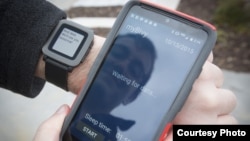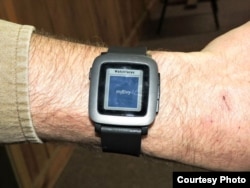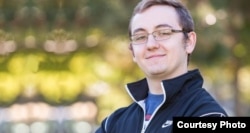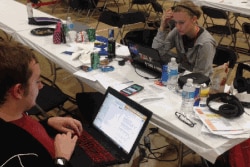When Tyler Skluzacek’s father came back from a year fighting with the U.S. military in the Iraq war, he was not the same person who had left home. Tyler was 13 years old when his father returned in 2007 from his tour of Iraq. He says when his father left, he was a very energetic, happy man.
“When he got back from Iraq, he was different,” said Tyler. “He was drinking. He was just not happy. I didn’t like it. I really didn’t know what was going on.”
The returning veteran suffered sleep panic attacks, a major disturbing symptom of Post-Traumatic Stress Disorder (PTSD).
“All my comrades, everybody had trouble sleeping,” Patrick Skluzacek said.
At first it was hard to understand the reasons behind his interrupted sleep patterns.
“We didn’t know what it was; jetlag,” he wondered. “We worked nights in Iraq and come back, and now we got to work day shifts again. Over a course of time, years later, when my friends and comrades started committing suicide, I think everybody took a better look at it.”
Terror at night
After many visits to psychologists, he learned that his condition has a name: night terror.
“Some time throughout the night, usually for me at 3:00 in the morning, it would just be like someone shocked me awake with a taser,” he explained. "It sends your heart rates as 200 beats per minute, you sweat ferociously. Sometimes you can vividly remember what it was about.
"But you’re so awake and you can’t just roll over and go back to sleep. I don’t know how I can explain that besides just being totally scared as if somebody, an intruder came into your house and jumped into your bed and scared you awake,” he said.
The “night terrors” disrupted almost every aspect of his life.
“It really did hurt me. You know, you go to work and you’re tired because you didn’t sleep. You come home, you’re tired. It was a bad, bad phase in my life, really bad.”
Since the 22-year-old son was studying computer science at Macalester College in St. Paul, Minnesota, he decided to try and help his dad and others who have similar problems. He got his chance through a competition called HackDC, a 36-hour coding competition in the nation's capitol.
Wearable solution
Skluzacek’ teamed up with three participants from other universities to create an app that would solve the problem. They called their team “The Cure,” and in less than two days, they came up with the solution: myBivy; short for bivouac, a military term for a safe place to sleep.
“[it is a] smartphone/smartwatch application,” he explained. You need both to run it. The person with traumatic nightmares wears it on their wrist when they go to bed. They hit start on the phone. And for the first time or days of wearing it, myBivy just watches you.”
At first, myBivy monitors the sleeper's movements and heart rate. Increasing heartbeats indicate a nightmare is about to set in, and that causes the watch to gently vibrate. The vibration is enough to disturb an oncoming night terror without disturbing the person’s deep sleep.
“... I was wearing the watch for two weeks and Tyler never told me when he turned it on,” said Patrick Skluzacek. "He has linked his phone to my phone so he can control it. He turned it on on Veterans Day last year. Apparently that night it kept me out of 10 different nightmares. I never slept the whole night. He called me like two days after and asked me how my watch is working. I said I don’t know because I’m just sleeping okay now. He told me that he had turned it on.”
After winning the top prize at HackDC and receiving $1,500 for the best PTSD Mobile App for Clinicians, the team started a fundraising campaign.
“We ended up raising 22 times our goal, approximately $26,000,” Tyler said. “We ended up in a startup competition called MobCon, in which five new businesses go up on stage and present and the winner gets developer help. We ended up going to that competition and winning the first place in that as well.”
MyBivy has been moving quickly from the testing phase to the clinical trials.
Seeing how having the good night's sleep has changed his father's life for the better, Tyler Skluzacek says he hopes the app will be available in the near future for others who are suffering from night terror.








